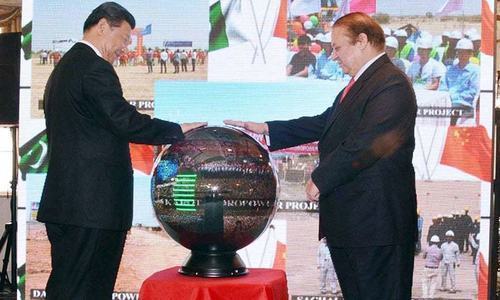THE completion of a stretch of road from Turbat to Hoshab as part of the China-Pakistan Economic Corridor is reason to feel gratified that the project is moving ahead with speed.
The length of the road is 193kms, and it is going to connect the port city of Gwadar with the road network in Sindh for northward travel. It will finally provide Gwadar with an alternative route to the Makran Coastal Highway, the route of which defeated the purpose of landing goods at the port.
We are told another route going directly north from Gwadar is also being built, passing largely through Balochistan, and in part through Khyber Pakhtunkhwa, and Punjab as well, which will provide a third alternative.
Following this, an airport and a railway line is also to be laid down, along with the necessary infrastructure for expanding residential facilities in Gwadar itself, including the provision of fresh water.
The completion of an admittedly small link of this expansive vision lends credence to the overall idea of laying down a large transport infrastructure across Pakistan, and further completion of the road network will be similarly welcome news as the project advances.
But it is important to keep in mind that questions about the overall vision of CPEC remain unresolved. At a seminar held only a few days before the inauguration of the Turbat-Hoshab link, for instance, queries were raised about how the project will actually help Pakistanis, beyond opening up a small cottage industry for roadside services.
In the words of one adviser to the Balochistan government, will Pakistanis basically be fixing punctures on Chinese trucks? The reply reportedly given to the participants of the seminar, from the commander of Southern Command of the Pakistan Army was that Chinese companies ought to be asked to explain how Pakistan will benefit from the larger vision of CPEC.
Whether this is fair or not, given that the companies are basically here as contractors to execute a project that they did not really develop, the fact remains that an answer to this question is important.
It is also true that the plan ought to be kept above politics, although given the scope of its vision and the nature of the projects under it, some amount of political wrangling is inevitable. Political questions notwithstanding, it is important to keep asking how CPEC is going to serve the interests of the people of Pakistan.
Roads and other transport infrastructure are badly needed in the country, but will the economic corridor help strengthen the internal links upon which the economy of Pakistani critically depends? Will a large highway serve our interests better than a slew of farm-to-market roads?
These are critical questions, and we need to keep asking them as more and more projects are completed to ensure that ultimately CPEC serves our interests first and all others’ second.
Published in Dawn, February 5th, 2016
















































